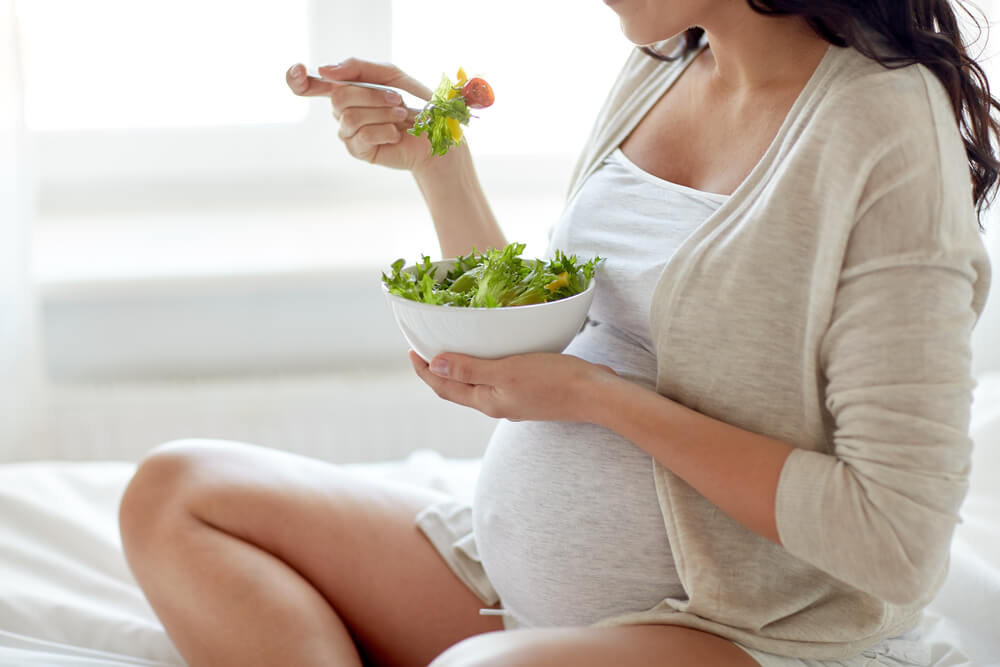Pregnancy presents many unique challenges ranging from increased nutritional requirements to nausea and vomiting. Certain supplements may be useful for addressing pregnant womens’ needs during this monumental time. (6)
Read on to discover the best pregnancy supplements.

Best pregnancy supplements to consider for your pregnant patients
Outlined below are some key supplements to consider for expectant mothers.
1. Prenatal multivitamin
A good-quality prenatal multivitamin is paramount throughout pregnancy as well as during the preconceptual period (ideally at least one month before conceiving). (1) General guidelines for prenatal multivitamins recommend that supplements should contain certain nutrients including folic acid, vitamin D, iodine, iron, vitamin B6, and vitamin B12. (3)
What does the research say? According to a 2017 systematic review and meta-analysis, prenatal multivitamin supplementation in high-income countries reduced the relative risk of small gestational age by 23%, neural tube defects by 33%, cardiovascular defects by 17%, urinary tract defects by 40%, and limb deficiencies by 32%. (20)
Folic acid
Most organizations and professional associations advise all women of reproductive age to obtain at least 400 mcg of folate each day, regardless of whether they plan to become pregnant. (11) Folic acid, the synthetic form of folate, is commonly added to prenatal multivitamins and is widely regarded as one of the most critical vitamins during pregnancy. This is largely due to its capacity for reducing the risk of neural tube defects. (3)
A 2021 systematic review and meta-analysis examining folic acid supplementation during pregnancy concluded that folic acid was associated with a positive impact on neurodevelopmental outcomes, including improved intellectual development and reduced risk of autism traits, attention-deficit hyperactivity disorder (ADHD), and behavioral and language problems. (2)
Although the terms folic acid and folate are commonly used interchangeably, it’s important to note the difference between them. Folic acid is the synthetic form of folate, whereas folate is the naturally occuring form that’s found in foods such as beef liver, spinach, and asparagus. Most fortified foods and supplements contain folic acid; however, that form may not be ideal for all individuals. Some people carry a mutation of the MTHFR gene, which impacts their ability to utilize folic acid. These patients should consider taking a daily prenatal vitamin that contains 5-MTHF, the methylated form of folate. (11)
Vitamin B12
Similarly to folic acid, vitamin B12 plays an important role in reducing the risk of neural tube defects, developmental delays, and anemia in infants. (14)
Supplementing with vitamin B12 or a prenatal multivitamin containing vitamin B12 during the preconception phase and pregnancy can help reduce the risk of low vitamin B12. (14) The authors of one study recommended that preconception vitamin B12 levels be greater than 221 pmol/L (300 ng/L) to reduce the risk of neural defects. (10)
View a review of vitamin B12 research, including uses, dosing, adverse effects, and more.
Iodine
Iodine is a trace mineral commonly added to prenatal supplements. Individuals require additional iodine during pregnancy, and some patients may be at risk of iodine deficiency, particularly if they avoid iodine-rich foods such as dairy, fish, and seafood. (12) One review noted that iodine supplementation during pregnancy significantly reduced the risk of postpartum hyperthyroidism by 68%. (5)
Iron
The increased blood volume that occurs during pregnancy can contribute to low iron status. (13) Many prenatal vitamins contain iron to meet the increased demand for this nutrient during pregnancy. According to a 2015 review, preventative iron supplementation reduced the risk of maternal anemia at term by 70%, iron deficiency anemia at term by 67%, and iron deficiency at term by 57%. (17)
Vitamin B6
Vitamin B6 is commonly added to prenatal vitamins and may also be recommended separately to pregnant patients. This vitamin has been shown to help prevent nausea and vomiting, common symptoms experienced during pregnancy. (4)(7)
View a review of vitamin B6 research, including uses, dosing, adverse effects, and more.
Vitamin D
A 2019 Cochrane review found that vitamin D supplementation during pregnancy may reduce the risk of pre-eclampsia by 52%, gestational diabetes by 49%, low birthweight by 45%, and severe postpartum hemorrhage by 32%. (16)
Dosage recommendations vary depending on vitamin D status. In individuals with a vitamin D status of less than 50 nmol/L, additional vitamin D beyond what is available in a prenatal multivitamin may be necessary. (4)
View a review of vitamin D research, including uses, dosing, adverse effects, and more.
2. Omega-3 fatty acids
Omega-3 fatty acid supplements, containing a combination of EPA and DHA, may help support infant cognitive development. (15) A 2018 Cochrane meta-analysis assessing the benefits of taking omega-3 fatty acids during pregnancy concluded that omega-3s reduced the risk of preterm birth (less than 37 weeks) by 11%, early preterm birth (less than 34 weeks) by 42%, and low birth weight by 10%. Research tends to favor omega-3 fatty acid formulations with higher amounts of DHA. (9)
Prenatal vitamins do not commonly contain omega-3 fatty acids or contain them in insufficient amounts. Therefore, a separate omega-3 fatty acid supplement containing EPA and DHA may be necessary.
View a review of omega-3 fatty acid research, including uses, dosing, adverse effects, and more.
3. Ginger
Like omega-3 fatty acids, ginger is not typically found in prenatal vitamins. However, this root is popular choice for patients experiencing nausea and vomiting. A 2020 systematic review investigating various alternative medicine treatments for nausea and vomiting in pregnancy found ginger and vitamin B6 to be equally effective up to 60 days. However, when taken beyond 60 days, vitamin B6 was found to be superior to ginger. (7) View a review of ginger research, including uses, dosing, adverse effects, and more.

4. Calcium
Most prenatal vitamins either don’t contain or contain limited quantities of calcium. Supplemental calcium may be recommended for the prevention of preeclampsia, particularly for individuals with low dietary intake of this nutrient. (18)
In a 2018 review, the risk of preterm birth was found to be 24% lower in individuals receiving high-dose calcium supplementation. Furthermore, supplemental calcium reduced pre-eclampsia risk by 55% overall and 64% in women with low-calcium diets. (6)View a review of calcium research, including uses, dosing, adverse effects, and more.

5. Magnesium
Magnesium supplementation, particularly magnesium citrate and magnesium aspartate, has been shown to be associated with higher Apgar scores in newborns, and a reduced likelihood of hospitalization by 35%. (8) Additional research suggests that magnesium may help improve leg cramps during pregnancy. (19)
View a review of magnesium research, including uses, dosing, adverse effects, and more.
The bottom line
Pregnant patients likely need some additional support during this monumental time. Whether you’re suffering from symptoms like morning sickness or they need help meeting their increased dietary requirements during pregnancy, certain supplements may help.
Fullscript’s evidence-based protocol for pregnancy support includes key ingredients for pregnancy and can be customized to meet your patients’ individual needs.
Taken with permission from www.fullscript.com/blog
- ACOG. (2020). Good health before pregnancy: Prepregnancy care. https://www.acog.org/womens-health/faqs/good-health-before-pregnancy-prepregnancy-care
- Chen, H., Qin, L., Gao, R., Jin, X., Cheng, K., Zhang, S., Hu, X., Xu, W., & Wang, H. (2021). Neurodevelopmental effects of maternal folic acid supplementation: A systematic review and meta-analysis. Critical Reviews in Food Science and Nutrition, 1–17. https://doi.org/10.1080/10408398.2021.1993781
- De-Regil, L. M., Peña-Rosas, J. P., Fernández-Gaxiola, A. C., & Rayco-Solon, P. (2015). Effects and safety of periconceptional oral folate supplementation for preventing birth defects. The Cochrane Database of Systematic Reviews, 2015(12), CD007950. https://doi.org/10.1002/14651858.CD007950.pub3
- Ee, C., Levett, K., Smith, C., Armour, M., Dahlen, H. G., Chopra, P., Maroun, P., Rao, V. S., Avard, N., Grant, S., Keedle, H., Armour, S., Arentz, S., Cave, A. E., Sutcliffe, K., & Templeman, K. (2022). Complementary medicines and therapies in clinical guidelines on pregnancy care: A systematic review. Women and Birth: Journal of the Australian College of Midwives, 35(4), e303–e317. https://doi.org/10.1016/j.wombi.2021.08.003
- Harding, K. B., Peña-Rosas, J. P., Webster, A. C., Yap, C. M., Payne, B. A., Ota, E., & De-Regil, L. M. (2017). Iodine supplementation for women during the preconception, pregnancy and postpartum period. The Cochrane Database of Systematic Reviews, 3(3), CD011761. https://doi.org/10.1002/14651858.CD011761.pub2
- Hofmeyr, G. J., Lawrie, T. A., Atallah, Á. N., & Torloni, M. R. (2018). Calcium supplementation during pregnancy for preventing hypertensive disorders and related problems. The Cochrane Database of Systematic Reviews, 10(10), CD001059. https://doi.org/10.1002/14651858.CD001059.pub5
- Khorasani, F., Aryan, H., Sobhi, A., Aryan, R., Abavi-Sani, A., Ghazanfarpour, M., Saeidi, M., & Rajab Dizavandi, F. (2020). A systematic review of the efficacy of alternative medicine in the treatment of nausea and vomiting of pregnancy. Journal of Obstetrics and Gynaecology: The Journal of the Institute of Obstetrics and Gynaecology, 40(1), 10–19. https://doi.org/10.1080/01443615.2019.1587392
- Makrides, M., Crosby, D. D., Bain, E., & Crowther, C. A. (2014). Magnesium supplementation in pregnancy. The Cochrane Database of Systematic Reviews, 2014(4), CD000937. https://doi.org/10.1002/14651858.CD000937.pub2
- Middleton, P., Gomersall, J. C., Gould, J. F., Shepherd, E., Olsen, S. F., & Makrides, M. (2018). Omega-3 fatty acid addition during pregnancy. The Cochrane Database of Systematic Reviews, 11(11), CD003402. https://doi.org/10.1002/14651858.CD003402.pub3
- Molloy, A. M., Kirke, P. N., Troendle, J. F., Burke, H., Sutton, M., Brody, L. C., Scott, J. M., & Mills, J. L. (2009). Maternal vitamin B12 status and risk of neural tube defects in a population with high neural tube defect prevalence and no folic acid fortification. Pediatrics, 123(3), 917–923. https://doi.org/10.1542/peds.2008-1173
- National Institutes of Health. (2022). Folate. https://ods.od.nih.gov/factsheets/Folate-HealthProfessional/
- National Institutes of Health. (2022). Iodine. https://ods.od.nih.gov/factsheets/Iodine-HealthProfessional/
- National Institutes of Health. (2022). Iron. https://ods.od.nih.gov/factsheets/Iron-HealthProfessional/
- National Institutes of Health. (2022). Vitamin B12. https://ods.od.nih.gov/factsheets/VitaminB12-HealthProfessional/
- Nevins, J. E. H., Donovan, S. M., Snetselaar, L., Dewey, K. G., Novotny, R., Stang, J., Taveras, E. M., Kleinman, R. E., Bailey, R. L., Raghavan, R., Scinto-Madonich, S. R., Venkatramanan, S., Butera, G., Terry, N., Altman, J., Adler, M., Obbagy, J. E., Stoody, E. E., & de Jesus, J. (2021). Omega-3 fatty acid dietary supplements consumed during pregnancy and lactation and child neurodevelopment: A systematic review. The Journal of Nutrition, 151(11), 3483–3494. https://doi.org/10.1093/jn/nxab238
- Palacios, C., Kostiuk, L. K., & Peña-Rosas, J. P. (2019). Vitamin D supplementation for women during pregnancy. The Cochrane Database of Systematic Reviews, 7(7), CD008873. https://doi.org/10.1002/14651858.CD008873.pub4
- Peña-Rosas, J. P., De-Regil, L. M., Garcia-Casal, M. N., & Dowswell, T. (2015). Daily oral iron supplementation during pregnancy. The Cochrane Database of Systematic Reviews, 2015(7), CD004736. https://doi.org/10.1002/14651858.CD004736.pub5
- Regitz-Zagrosek, V., Roos-Hesselink, J. W., Bauersachs, J., Blomström-Lundqvist, C., Cífková, R., De Bonis, M., Iung, B., Johnson, M. R., Kintscher, U., Kranke, P., Lang, I. M., Morais, J., Pieper, P. G., Presbitero, P., Price, S., Rosano, G. M. C., Seeland, U., Simoncini, T., Swan, L., Warnes, C. A., … ESC Scientific Document Group (2018). 2018 ESC Guidelines for the management of cardiovascular diseases during pregnancy. European Heart Journal, 39(34), 3165–3241. https://doi.org/10.1093/eurheartj/ehy340
- Supakatisant, C., & Phupong, V. (2015). Oral magnesium for relief in pregnancy-induced leg cramps: A randomised controlled trial. Maternal & Child Nutrition, 11(2), 139–145. https://doi.org/10.1111/j.1740-8709.2012.00440.x
- Wolf, H. T., Hegaard, H. K., Huusom, L. D., & Pinborg, A. B. (2017). Multivitamin use and adverse birth outcomes in high-income countries: A systematic review and meta-analysis. American Journal of Obstetrics and Gynecology, 217(4), 404.e1–404.e30. https://doi.org/10.1016/j.ajog.2017.03.029
Disclaimer
The information in this article is designed for educational purposes only and is not intended to be a substitute for informed medical advice or care. This information should not be used to diagnose or treat any health problems or illnesses without consulting a doctor. Consult with a health care practitioner before relying on any information in this article or on this website.



